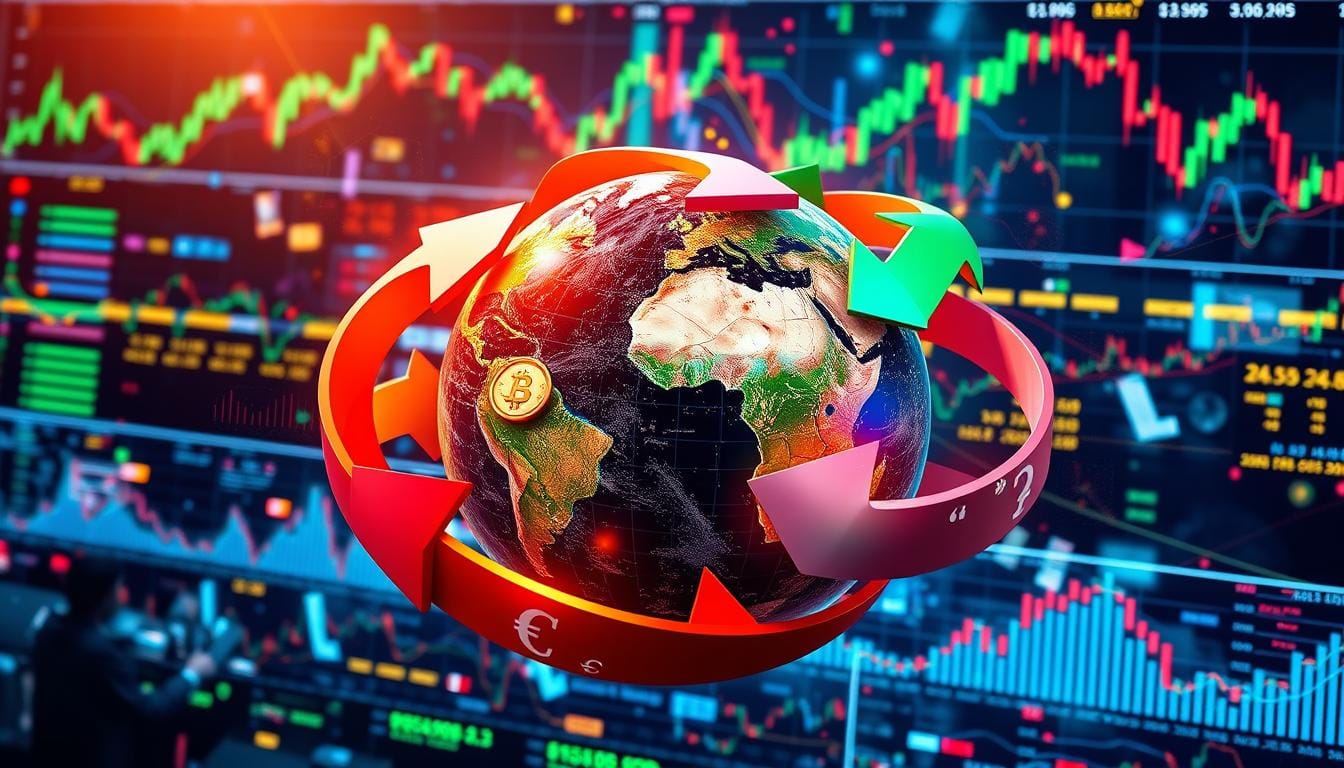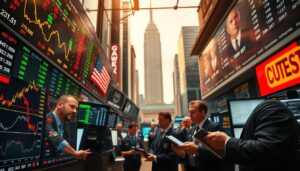החלפת מטבע היא מרכזית בתחום הפיננסים הבינלאומיים וב-מסחר במט"ח. זה אומר להחליף מטבע אחד במטבע אחר. זה חיוני לעסקים אישיים ולמסחר גלובלי. שוק ה-forex גדול ופעיל. הוא פועל כל היום, כל יום, מאפשר לאנשים לקנות, למכור ולהחליף מטבעות שונים. לדעת כיצד החלפת מטבע עובדת חשוב. זה עוזר לסוחרים ולמשקיעים להבין מגמות שוק וסיכונים.
התנודת קבועה של החלפת מטבע משפיעה רחבות. היא משפיעה על עסקים אישיים ועל המצבים הכלכליים והפוליטיים הגדולים יותר.
מסקנות מרכזיות
- החלפת מטבע היא חיונית למסחר והשקעה בינלאומיים.
- שוק ה-forex פועל 24/7, משקף שינויים כלכליים בזמן אמת.
- הבנת תנודות ערך המטבע עוזרת לסוחרים לקבל החלטות מושכלות.
- ה-מנגנון ההחלפה משפיע על עסקים אישיים ועל מדדים מקרו-כלכליים.
- שינויים בערכי המטבע עשויים להשפיע על השקעות ועל יציבות כלכלית.
יסודות תמריץ מטבע
הבנת תמריץ מטבע היא מרכזית לכל מי שחוקר את שוק ה- Forex. היא מבוססת סביב זוגות מטבע. זוגות אלה מציגים את הערך של מטבע אחד בהשוואה למטבע אחר. ה- שער החליפין אז מספר לנו כמה מטבע אחד נדרש לקנות מטבע אחר. זהו היסוד של המסחר.
הבנת זוגות מטבע
זוגות מטבע מציגים אילו מטבעות נמסרים. הראשון הוא המטבע הבסיס והשני הוא המטבע הציטוט. לדוגמה, במקרה של EUR/USD, היורו הוא הבסיס והדולר האמריקאי הוא הציטוט. זה עוזר לסוחרים לקבל החלטות בדינמיקת שוק המטבעות השונה תמיד.
תפקיד של שערי חליפין
שערי חליפין משתנים עקב מצבי כלכלה, תנאים פוליטיים ומצב השוק. ה- מחיר הציטוט/הביד הוא המחיר הזמין הטוב ביותר למסחר בזוג מטבעות. מטבעות מרכזיים כמו הדולר האמריקאי, היורו והין היפני מובילים את השוק מכיוון שהם מקובלים ברחבי העולם ונזילים.
הסבר על תמריצי המטבע: השפעות על מסחר הפורקס
כדי להבין את המטבעות, עליך לדעת את הגורמים המרכזיים שמשפיעים על מסחר הפורקס. נזילות השוק והאי צפיפות הם קריטיים. הם משפיעים על תנועות מחירים באופן משמעותי. שימוש בניתוח פונדמנטלי וטכני עוזר לתכנן טוב יותר דרך שינויי המחירים הללו.
נזילות השוק והאי צפיפות
נזילות השוק מהווה את היכולת לקנות או למכור מטבעות בלי שינויים גדולים במחיר. שוק נזיל מכיל הרבה קונים ומוכרים, מה שהופך את העסקאות לקלות יותר. אך, אם הנזילות נמוכה, הפרשים גדלים וכן גם האי צפיפות. מצב זה עשוי להיות סוחף, אך גם פותח אפשרויות לסוחרים. הם יכולים להרוויח מהתנועות הללו אם יש להם את האסטרטגיות הנכונות.
ניתוח פונדמנטלי וטכני
סוחרים משתמשים בניתוח פונדמנטלי כדי להביט על גורמים כלכליים שמשפיעים על ערכי המטבעות.
ריבי ריבית, נתוני תעסוקה, ואירועים גיאופוליטיים הם מדדים מרכזיים. הם עוזרים לחזות תנועות בשוק הפורקס. ניתוח טכני, מצד שני, בודק תרשימי מחירים ונתונים עבריים כדי למצוא מגמות. שימוש בשני השיטות מאפשר לסוחרים לבנות אסטרטגיות יציבות. הם לוקחים בחשבון את התמונה הכלכלית הגדולה וההתנהגות במחירים בעבר.
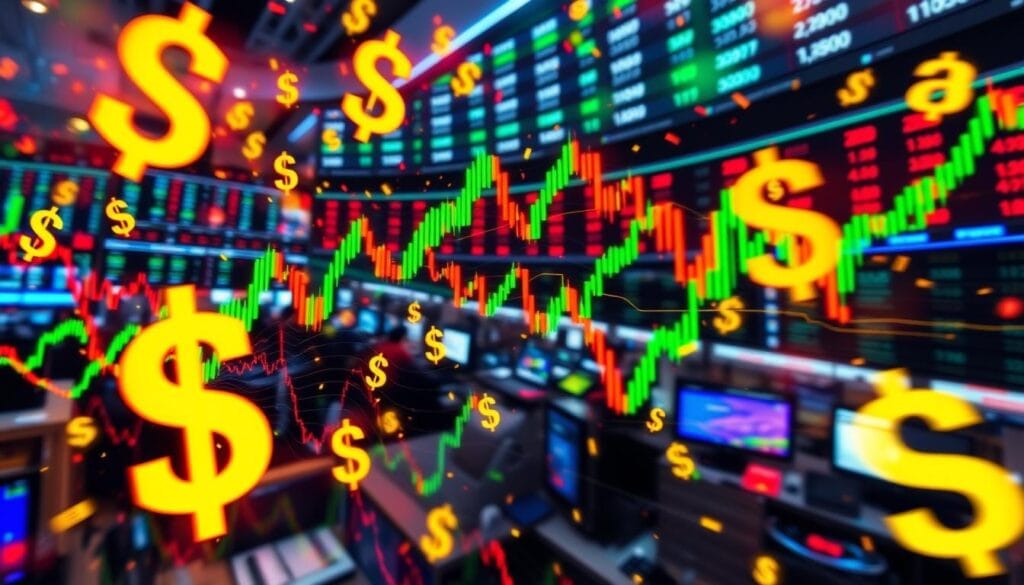
| סוג ניתוח | תיאור | יישום |
|---|---|---|
| ניתוח יסודי | ניתוח מדדים כלכליים לצורך תחזיות של תנודות במטבע. | שימושי לאסטרטגיות מסחר ארוכות טווח. |
| ניתוח טכני | חקירת תנודות מחירים היסטוריות לצורך חיזוי מגמות עתידיות. | יעיל לעסקאות קצרות טווח ונקודות כניסה/יציאה. |
השפעת המדדים הכלכליים על שערי המטבע
מדדים כלכליים משחקים תפקיד מרכזי באופן בו עובדים שערי המטבע. הם מעניקים לסוחרים מידע חשוב. דברים כמו ריבית ו-אינפלציה הם גורמים גדולים בעולם הפיננסי. ה-מאזן מסחר וה-צמיחה כלכלית מציגים גם את עוצמת המטבע של מדינה.
ריבית ואינפלציה
ריבית עוזרת להחליט על ערך המטבע. בנקים מרכזיים משנים את הריבית הזו כדי לנהל את הכלכלה ולשלוט ב-אינפלציה. ריביות גבוהות נוטות למשוך כסף זר. זה מחזק את המטבע. אך, ריביות נמוכות עשויות להוביל למטבע חלש כשמשקיעים מחפשים אפשרויות טובות יותר.
אינפלציה מראה כמה תוכל לקנות עם המטבע שלך. כאשר האינפלציה גבוהה, הכסף שלך קונה פחות. בנקים מרכזיים עשויים להעלות את ריביות כדי לתקן את זה. היציבות בין ריביות ואינפלציה היא מרכזית לכלכלה טובה.
מאזן מסחר וצמיחה כלכלית
היתרת מסחר מספרת לנו אם מדינה מוכרת יותר ממה שהיא קונה. יתרה מעידה על יותר ייצואים ומטבע חזק יותר. זה בגלל שקונים זרים צריכים את המטבע המקומי כדי לקנות סחורות. גריעה מעידה על כך שהמטבע עשוי לחלש מכיוון שהמדינה צריכה יותר כסף זר ליבואים.
צמיחה כלכלית, שמתקציב ה-GDP, חשובה גם. כלכלה חזקה מושכת משקיעים ומעלה את ערך המטבע. צפיה באינדיקטורים כמו יתרת מסחר וצמיחה כלכלית עוזרת לסוחרים.
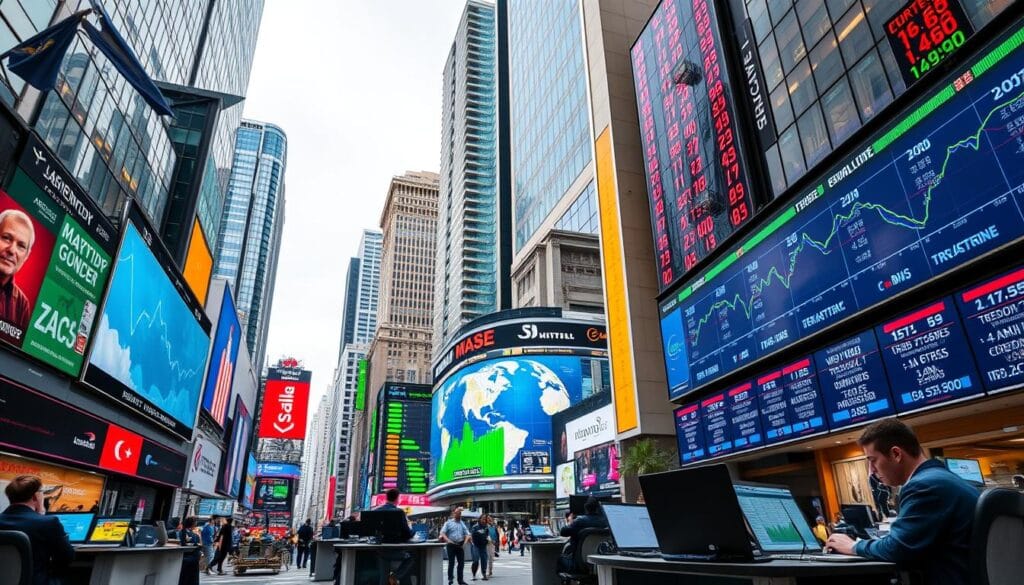
תפקידם של הבנקים המרכזיים בתמריצי מטבע
הבנקים המרכזיים משחקים תפקיד מרכזי בעיצוב תמריצי מטבע. הם משתמשים במדיניות מוניטרית כדי להשפיע על
ערך המטבע ויציבות. הם מביטים בריבית, צמיחה כלכלית ושעות עבודה כדי לנהל את הכלכלה.
מדיניות מוניטרית וערך מטבע
מה שבנקים מרכזיים עושים משפיע הרבה על ערך המטבע. הם מתאימים ריבית כדי לעודד הוצאה או להגדיל חסכון. הורדת הריבית עשויה לגדל את הכלכלה אך עשויה לחלש את המטבע כאשר אנשים מחפשים תשואות טובות במקומות אחרים. מאידך, עליית הריבית עשויה לחזק את המטבע אך לאט את צמיחת הכלכלה. זה קו דק ללכת כאשר מתמקדים בשמירה על יציבות ערכי המטבע והכלכלה בריאה.
התערבויות בשוק ויציבות מטבע
בנקים מרכזיים גם עושים צעדים כדי לשמור על יציבות המטבע. הם קונים או מוכרים רזרבות מטבע כדי לנהל שערי חליפין ולהחליק תנועות שוק פתאומיות. הצעדים הללו הולכים יד ביד עם מטרות מדיניות כלכלית כלליות. זה עוזר לשמור על הכלכלה בטוחה מהשפעות חיצוניות גדולות. התערבות טובה עושה את המסחר יותר צפוי, עוזרת לעסקים ולמשקיעים לתכנן טוב יותר.
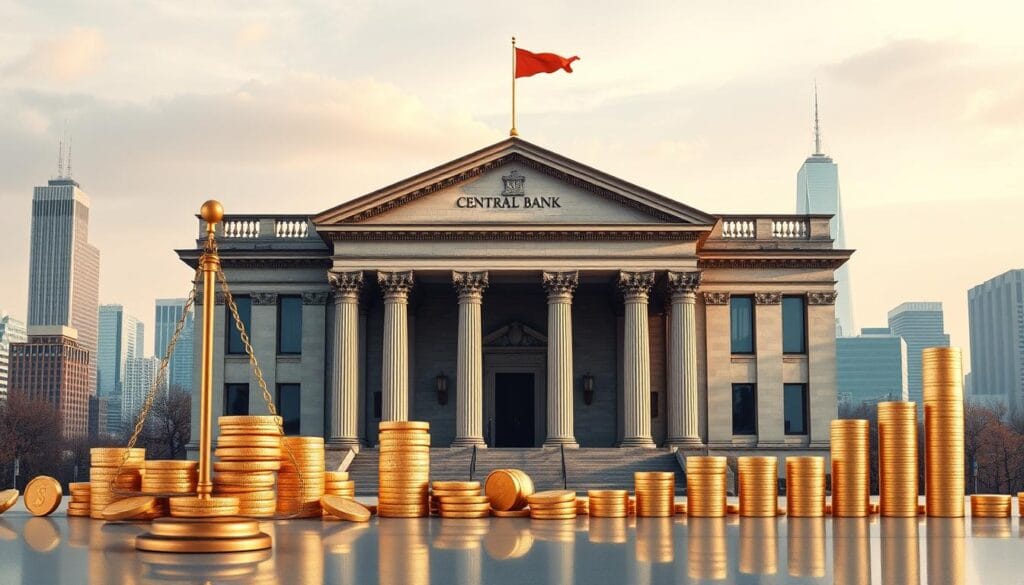
| כלי מדיניות מוניטרית | השפעה על מטבע | פעולת דוגמה |
|---|---|---|
| התאמת ריבית | משפיע על הלוואות והוצאות | העלאת הריבית כדי לקבוע את האינפלציה |
| התערבות במטבע | ניהול שינויים בשער חליפין | קניית מטבע מקומי כדי לחזק את הערך |
| פעולות בשוק הפתוח | משפיע על הצעת הכסף ועל נזילות | קנייה/מכירת אגרות חוב ממשלתיות |
| דרישות ריזרבה | משפיע על יכולת ההלוואה של הבנקים | הגברת הריזרבות כדי לרדת על ההלוואה המוגברת מדי |
מסקנה
המרת מטבע היא חיונית במסחר ב-פורקס. לדעת כיצד ערכי המטבע משתנים היא חיונית. השינוי הזה נגרם על ידי גורמים כלכליים שונים.
סוחרים חייבים לעקוב אחר שערי החליפין ואיך הם משפיעים על הכלכלה. ה-השפעה הכלכלית של שערי חליפין חשובה כאן.
מדיניות בנק המרכזי ותנודות השוק משפיעות בצורה משמעותית על הפורקס. הבנת הגורמים הללו עוזרת לסוחרים לבנות אסטרטגיות חזקות.
האסטרטגיות האלו חייבות להסתגל מהר לשינויים בשוק. המיומנות הזו היא מרכזית להצלחה בפורקס.
ידע עמוק בהמרת מטבע מעלה את הסיכויים לצמיחה של הסוחרים. זה מאפשר להם לנצל הזדמנויות כלכליות גלובליות.
על ידי לימוד מגמות כלכליות ופעולות בנקאיות, משתתפי פורקס עושים בחירות חכמות. אלו מתאימים למטרותיהם וחלומותיהם הפיננסיים.

